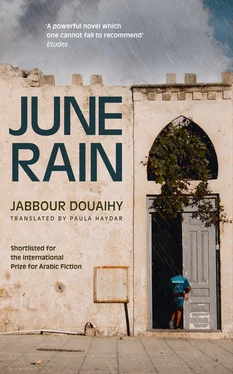There were some eloquent spokesmen among them who achieved prominence. They were half-educated and pretended to know a lot about the past and to have read many books. They fabricated an ancient oral history of their families, one that nobody but them exchanged and transmitted. It confirmed the precedence of their presence here and the seniority of their influence over this piece of land and their ownership of it, as if they never migrated to it from any other place in the world. If they relented on this idea, it was only to accept being descended from a French family that had come to the East with the Crusades, which was a history that attributed to their ancestors heroic deeds from a past in which they allied themselves with the Shahabi princes, expelled the Jacobites from the environs of their town, or rang the church bells in Muslim villages that had never heard such bells before. Some of them also discovered that their ancestors were the founders of the town, which they had been cheated out of in the eighteenth century and felt it was high time they got it back in the middle of the twentieth century.
One of their judges, who had been a man of letters, undertook the task of recording for them in a collection of books the ancestry and genealogy which they had spun for themselves. In everything he wrote he was careful not to slight anyone’s ancestry, for if something like that were to happen, it would have dire consequences. So he attributed to every family and every jibb only the best qualities that they themselves desired. He recounted their deeds the way they would want them to be recounted; in other words, he did not mention anything humiliating or any act of betrayal on their part, but rather gave a complete and perfectly connected history of superiority and courage.
When it came to other families, they discovered or recalled their endless vices, such as their extreme stinginess or the ease with which their votes could be bought during elections, or how difficult they were as neighbours especially in the orchards, never hesitating to encroach upon other people’s property. They tilled and planted other people’s land and ate the harvest if no one stopped them. Or they were mindful of the behaviour of the women of those competing families, such as how easy and fickle-hearted they were around men. They accused their competitors of not being indigenous to the town and claimed that any review of their actions in the distant or recent past was the best proof of their dubious ancestry. Add to that all the backstabbing and scheming and cowardice, which they attributed to the others. They detailed all of that in lengthy descriptions, which they said revealed the crimes of their enemies, starting with the theft of cattle and persecution of the people of the neighbouring farms at the height of the horrors of WWI and continuing on to assassinations they planned out and then artfully blamed on others. On the other hand, they attributed to themselves and their relatives great bravery and the ability to face up to any challenge, and they recounted their dignitaries’ virtues, such as generosity and compassion for the poor and the farmers — asking about the harvest and wondering how the cows, which they knew by name, were faring — and political acumen and awareness of the constants and the variables in the positions of the great powers.
Their women were even more severe than the men when it came to retaliating. One woman in particular gained a reputation for this, the one who told her children, ‘Any one of you who hesitates to avenge his brother will be cut off from his father’s inheritance.’ And there was that other woman. After her husband was shot down by soldiers, she covered him with a white sheet as she called out to his cousins not to pay any attention and just go on fighting.
It was quite bewildering to the members of the small families, who, despite having sufficient numbers, did not have the good fortune of having a notable family member who could reunite them and put together a noble family ancestry for them. Eventually they were content and felt compensated for their frustration by participating in the special fund set aside for burial expenses or aid to the sick and the poor among them. They divided up their loyalty between the big families causing themselves to be called lafeef , the hangers-on, by some and urra , the stray sheep that joined the herd, by others. They went overboard with their loyalty and jumped at the chance to be of service, composing jingles at election time and sticking their heads out of car windows to make victory signs, going out in groups into the villages and surrounding farms, securing votes for their supporters and giving dirty looks to backers of their opponents. They sent out delegates to all the villages and into the voting precincts, both the men’s and the women’s precincts. They roamed about the towns day and night for weeks before Election Day, and refused to go behind the curtain to cast their votes, insisting instead on casting their ballots openly, thereby proving to their leaders that their allegiance was as pure as white milk.
Fearing what might happen if the two parties came too close to each other, the Governor of North Lebanon asked each party to provide a schedule of their visits to make sure they didn’t run into each other and start shooting. Once, however, the Governor neglected to do so, or he purposely didn’t ask for their schedules for political reasons, as it was said. He let both parties attend the same service for the one-year anniversary of the death of the bishop’s brother in one of those towns at the base of the mountain where they ended up confronting each other and drowning in a river of blood. The resentments that they had been dragging around with them for decades ended in an all-out war, set ablaze as they dug trenches and amassed cannons and heavy artillery, and which left no innocent person safe from kidnapping and no passer-by safe from being shot. And if at some point the state was able to dispatch troops to separate the fighters and impose security, even if only for a few months, the only effect was to bring the war off the streets and back into their hearts where it waited for the opportunity to flare up again.
At exactly five o’clock, Haifa Abu Draa let out a loud scream. A scream that pierced like a knife.
I was at home, at my parents’ house. I’ve never moved out of their house, and I never will til the day I die. I never got married. There were three of us girls. We were good friends to each other in our youth. Every day we went out, walking together. We held hands and set out in the evening for a stroll along the river road. We wore our best clothes and did everything we could to attract the boys. If one of the boys we were trying to interest was forward with us, we turned red with embarrassment and turned our faces in the other direction. We turned red with embarrassment and turned our faces away so much that all three of us ended up without husbands.
When Haifa Abu Draa screamed, I was at home because I didn’t like Sundays. I don’t know what other people like about Sundays. I always spent them at home, like any other day. I didn’t like to assign them any special importance, except for going to church. I went to church and came back home to do the laundry, wash the dishes and quarrel with my mother just like every other day of the week. We raised our voices, having a good time together, arguing over everything. I always liked housework, ever since I was a small child. I liked cleaning and tidying up and felt comfortable bickering with my mother.
I didn’t like Haifa Abu Draa’s scream, and neither did my mother. She was sitting, my mother that is, embroidering a comforter, facing me on the couch. She looked at me and I looked back at her.
Читать дальше












